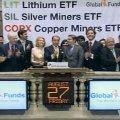The latest economic snapshot shows an economy that's barely growing. Despite a slight drop in weekly jobless claims, businesses remain reluctant to hire new workers and fewer Americans are buying homes.
Economist Julia Coronado at BNP bank says the revised GDP estimate shows how difficult the economic recovery is going to be. "I wish I could say it was going to be right around the corner, but I think this will be a unique and painful recovery," she said. But in another example of the stock market's increasingly volatile nature, investors found something to cheer about: One - that the reduced domestic output was due mostly to Americans buying more imported goods. And two - that the lower estimate managed to beat Wall Street expectations by two tenths of a percent.
Dan Arnall, a financial analyst for ABC News, said "We're not in this quarter seeing actual growth declining, but we are still in the kind of period where people really feel a lack of confidence and fear in their economic prospects.' That lack of confidence is cited as one of the reasons why home sales last month dropped to a 15 year low. Economist Jed Smith at the National Association of Realtors says it boils down to jobs. "The issue for home sales, like the issue for the rest of the economy, right now is jobs. We've got some economic growth, but it's a jobless growth," he said. Job numbers are not expected to see much improvement next week when the Labor Department releases its monthly report -- a nagging problem for the White House with mid-term elections less than 10 weeks away.
Deputy Press Secretary Bill Burton said, "The president is doing everything that we think is appropriate to continue moving the economy in the right direction." Reacting to the lower GDP numbers on Friday, Federal Reserve Chairman Ben Bernanke promised to take further steps to boost the slowing economy.
Growth in the second half of the year is expected to remain tepid at two percent. The U.S. economy needs to grow about three percent just to keep the unemployment rate from rising.

